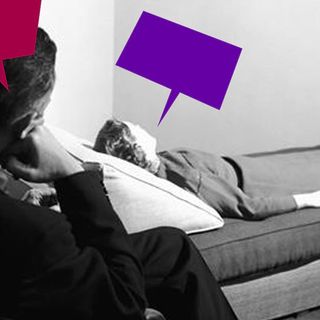
Expect Your Love to Change Over the Course of Marriage
It’s the key to staying satisfied.

Culture sells us a clear idea of love: the intense desire, the overt displays of affection and longing, all culminating in red-hot sex. And many enter marriage expecting this romance — to continue, perhaps, in the case of a love match, or to begin, perhaps, in the case of an arranged relationship. Even people who take a more prosaic long-view of marriage often find themselves still measuring the health of a union by these yardsticks, worrying over the loss of ‘spark’ as the years go by.
A review of studies, published in the Journal of Sex Research, examining sexual desire in relationships that span decades has yielded a few lessons, however, in keeping the fires burning. The first lesson? While the loss of desire is a common feature of long-term relationships, it doesn’t have to be. It may depend most on whether you see that as inevitable, or see sexual desire as changeable. Writes Kate Morgan at The Cut: “Acknowledging a lack of desire doesn’t highlight a problem so much as relieve the problem, the review authors found: In several studies, ‘realistic expectations that sexual desire will ebb and flow throughout the relationship’ was linked to a greater ability to sustain that desire in the long run.”
The study authors also noted a difference between desire (a psychological response) and arousal (a physical response); these states are, at worst, conflated, and at best considered essential complements. But desire can be present even when arousal isn’t, and vice versa. Appreciating these variances may also help us avoid obsessing over what is ‘normal’ — an understandable worry that, when played on a loop, can reduce sexual desire.
“Maybe you have desire but not arousal, and you need to use lubricant. Maybe the desire comes later, after sex,” one of the study authors told Morgan. “That also accounts for non-sexual motivations for sex, of which there are many. Desire can pop up because your partner got the kids off to bed, or because you had a great day at work.”
One big sexual motivator for long-married couples? Not physical desire but emotional intimacy. Which may mean a different kind of physical experience than a quickie motivated by early-days passion.
The biggest mood killer? Surprisingly, perhaps, it’s not fighting — which if done in a healthy way can be good for a relationship and a sex life. It’s avoiding conflict.
Which suggests the biggest takeaway from this study is this: That love, just like the people in it, changes over time in ways it’s best to confront. It’s an argument Heather Havrilesky, in her essay “What Romance Really Means After 10 Years of Marriage,” makes hilariously and compellingly:
“Our dumb culture tricks us into believing that romance is the suspense of not knowing whether someone loves you or not yet, the suspense of wanting to have sex but not being able to yet, the suspense of wanting all problems and puzzles to be solved by one person, without knowing if they have any time or affinity for your particular puzzles yet. … Romance must be carefully staged and art-directed, so everyone looks better than they usually do and seems sexier and better than they actually are, so the suspense can remain intact.
You are not better than you are, though, and neither is your partner. That’s romance. Laughing at how beaten-down you sometimes are, in your tireless quest to survive, is romance. It’s sexy to feel less than totally sexy and still feel like you’re sexy to one person, no matter what. Maybe suspense yields to the suspension of disbelief. Maybe looking for proof yields to finding new ways to muddle through the messes together.”
Havrilesky argues it’s the quest for joint survival that becomes sexy over time. And if a long and happy relationship and sex life is, as the study suggests, about accepting the highs and lows and everything in between, it may be that more of us than we think have already found it — it’s recognizing it that’s the secret.
Liesl Goecker is The Swaddle's managing editor.
Related


It’s Time to Recognize Culture Affects Our Understanding of Psychology
